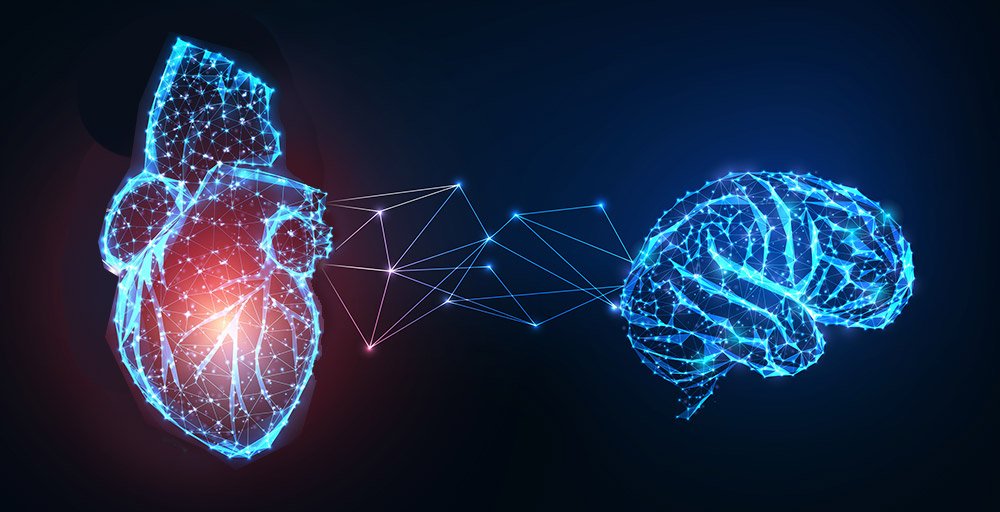Heart-brain connection: Researchers may have discovered why people with heart failure are more likely to develop Alzheimer’s and other cognitive deficits. According to this, the heart disease changes the winding of the DNA in the hippocampus, the memory center of the brain. This epigenetic change impairs the gene activity and thus the function of the brain cells. But there could be a remedy against it.
Around four million people in Germany suffer from heart failure – their heart muscle is weakened from a heart attack or other illness and pumps less blood through the body. As a result, however, not only physical performance is limited, but also mental performance: “People with cardiological problems and especially cardiac insufficiency can experience noticeable cognitive deficits and an increased risk of Alzheimer’s disease,” explains André Fischer from the German Center for Neurodegenerative Diseases (DZNE) in Göttingen. The gray matter of the brain is also often reduced when the heart is weak. But why this is so has been unclear until now.
Heart failure changes gene activity in the hippocampus
Now Fischer and his team have a new lead. For their study, they examined the brains of mice that suffered from cardiac insufficiency. “In memory tests, the mice with heart failure performed significantly worse than their healthy counterparts,” explains Fischer. “We then examined the nerve cells of the hippocampus.” The hippocampus is the memory center of the brain, it is also the region that is particularly badly damaged in Alzheimer’s disease and other dementias.
The examinations showed: If the heart is weakened, this also affects the neurons in the hippocampus. They show increased stress signals and their gene activity is changed, as the scientists found. Among other things, more than 4,600 genes are read less strongly, many of which are crucial for mental performance and memory. One possible cause for this could be the poorer supply of oxygen to the brain cells.
“These changes in the hippocampus gene expression in the heart-weakened mice are similar to the changes that occur in models of neurodegenerative diseases,” explain Fischer and his team.
The neurons’ DNA remains wrapped too tightly
But how do these changes come about? Closer analyzes revealed that the genetic material in the hippocampus cells in heart-weakened mice had a different three-dimensional structure – it was literally twisted crookedly. “Genes can only be active if they are accessible to the machinery of the cell. To do this, the DNA has to be wrapped a little more loosely at the appropriate points. Similar to a ball of yarn with loops protruding from it, ”says Fischer.
In the mice with heart problems, however, the DNA in the nerve cells was wrapped more tightly than in their healthy counterparts. The scientists identified chemical changes in the histones as the cause of this tight winding. These are special proteins that form the supporting structure for the DNA: They function, as it were, as spools of thread around which the DNA threads are wound.
“Our study provides the first insight into how heart failure can lead to neuronal function deficits,” the researchers state.
Cancer drug helps against cognitive failures
But not only that: the team has also found the first starting points for a therapy against these impairments. The mouse tests showed that the cancer drug vorinostat alleviated the cognitive failures of the heart-weakened mice and also the changed gene activity in the hippocampus – although the heart’s pumping capacity remained weak. “Vorinostat was able to normalize some of the gene expression in the mice,” report Fischer and his team.
This is possible because the cancer drug affects the winding of the genetic material and promotes the formation of loose loops. This makes previously blocked gene areas accessible again to the cell machinery. “Vorinostat has been shown to have an effect on the histones and thus on gene activity,” says Fischer. “Our study shows possible starting points for the therapy.”
Hope for new therapies
If this is confirmed, then such active ingredients could possibly help to protect patients with heart failure from dementia and other cognitive deficits. But there is still one need for research, as the scientists also emphasize: “The fact is, however, that we do not yet understand why the gene activity in the hippocampus is disturbed as a result of heart failure,” says Fischer.
“What role does the inadequate blood supply to the brain play? Are substances released from the sick heart that affect the histones? We want to investigate this on patients with heart problems, ”the researcher concludes. (EMBO Molecular Medicine, 2021; doi: 10.15252 / emmm.201911900)
Source: German Center for Neurodegenerative Diseases eV (DZNE)
–


